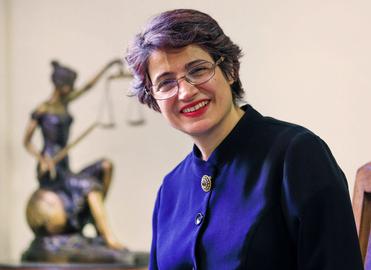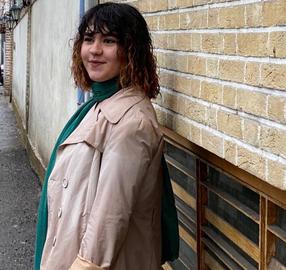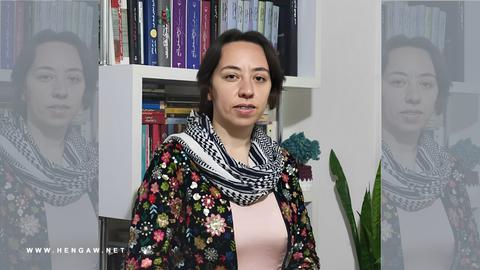Nasrin Sotoudeh is an internationally acclaimed and tireless advocate of human rights and a defender of political prisoners. For her efforts she has been harassed and imprisoned numerous times, but she has remained defiant, both inside prison and out.
Sotoudeh is a member of the Defenders of Human Rights Centre and the Society for Protecting the Rights of the Children and has been an active participant in the One Million Signatures campaign, aimed at changing discriminatory laws against women in Iran.
She was arrested and sentenced to six years in prison and banned from practising law for 10 years in the aftermath of the disputed 2009 presidential election after she represented a number of civil and political activists who were sent to prison or executed.
Imprisoned, Flogged, Banned from Leaving Iran
Since then Sotoudeh has been repeatedly arrested and tried on trumped-up charges and has received a range of sentences, including a ban on leaving Iran, flogging, freezing of her bank accounts and prison terms totaling 38 years. She has also been beaten and denied visitors, including her children, while behind bars.
Sotoudeh was born in Tehran in 1963. She graduated in philosophy but her studies were interrupted when the universities were closed after the so-called Cultural Revolution was launched in 1980 by the newly-established Islamic Republic to purge academia of Western and non-Islamic influences. When the universities reopened she was accepted by Tehran’s Shahid Beheshti University and received her master’s degree in international law from there. She passed the bar exam in 1995 but had to wait eight years to receive her permit to practice. In the meantime she contributed to reformist publications.
Sotoudeh started her career at the Iranian Ministry of Housing’s legal office, and two years later joined the legal department of state-owned Bank Tejarat. During her time at the bank she was involved in preparing the legal case and the legal arguments for many of the cases that Iran presented at the Permanent Court of Arbitration in The Hague in its dispute with the United States.
In the years before the 2009 presidential election Sotoudeh represented defendants in many high-profile political and human rights cases, including Nobel Peace Prize laureate Shirin Ebadi, democracy activist Heshmatollah Tabarzadi, journalist Isa Saharkhiz, Kurdish activist Mohammad Sadeq Kaboudvand, human rights activist Parvin Ardalan and women's rights activist Noushin Ahmadi Khorasani. She also took on many cases of child abuse and of minors on death row.
Hunger Strikes and Awards
When asked how she became a human rights defender Sotoudeh said that as a lawyer she was forced to make a choice. “When a lawyer witnesses unfair trials, when a lawyer witnesses the execution of minors, either they must turn their back or they must face up to the problem they are witnessing,” she said in an interview. “I think I entered the field of human rights on the day I decided not to avoid such issues.”
In the aftermath of the 2009 election the Islamic Republic stepped up its persecution of dissidents, journalists and human rights activists on a dramatic scale. Sotoudeh was arrested on September 4, 2010, and charged with propaganda against the regime and engaging in activities against national security.
On September 25, 2010 she went on a hunger strike to protest against being denied visits and phone calls from her family. The hunger strike lasted for four weeks. On October 17, 2012 she started another hunger strike that lasted for 49 days. She ended her hunger strike when a group of members of parliament visited Evin prison where she was being held and pressured prison officials to lift newly-imposed restrictions.
While Sotoudeh was in detention the authorities banned her husband Reza Khandan and her 12-year-old daughter Mehraveh from travelling outside the country.
Her prison experience did not break her spirit. When she was transferred to a new cellblock at Evin, a “miracle happened,” her cellmate Susan Tabianian said in an interview with IranWire. “Before Sotoudeh arrived the prisoners all had very different political views, but she brought a positive harmony that took root among all of us.”
Sotoudeh’s detention led to an international outcry and demands for her release from human rights organisations and prominent individuals including former Czech President Vaclav Havel.
Disregarding international appeals, the Revolutionary Court sentenced Sotoudeh to 11 years in prison and banned her from practising law or leaving the country for 20 years. The appeals court reduced the prison sentence to six years and the ban to 10. In early 2011 she was sentenced to five extra days in prison for wearing “bad hijab” and protesting against the handling of her case.
Sotoudeh has received a number of awards for her defence of human rights and freedom of speech, including the 2011 PEN/Barbara Goldsmith Freedom to Write Award and the 2012 Sakharov Prize for Freedom of Thought from the European Parliament. Hillary Clinton, then the US secretary of state, issued a statement praising Sotoudeh and Panahi and expressing regret that they had not been able to receive their awards in person.
The Sakharov Prize was shared with the jailed Iranian filmmaker Jafar Panahi. When a delegation of European lawmakers visited Iran in 2013 they insisted on meeting them both. After initially resisting the demand, the government gave in and the group met them at the Greek embassy in Tehran. The meeting created an uproar among hardliners and three cabinet ministers from President Hassan Rouhani’s administration were summoned to parliament for questioning.
Released Without Explanation, Arrested Again
In September 2013, a few days before President Rouhani was to address the United Nations and after serving half of her prison sentence, Sotoudeh and 10 other political prisoners were released without any explanation.
After her release Sotoudeh and a number of other human rights activists picketed the Iranian Bar Association in protest against the ban on their right to practise law. Eventually, in June 2015, the ban was reduced to nine months.
“Her ongoing protest has provided many with a platform to express their grievances,” an article in the magazine Foreign Policy said of Sotoudeh. “Her defiance and fearlessness appear to encourage them.”
“Creating fear and creating courage are both contagious,” Sotoudeh told Foreign Policy. Through one’s actions, she said, “it’s possible to encourage others to rise above their fear and stand up for their rights.”
Despite all the harassment and pressure from the Islamic Republic, Sotoudeh remained as active as ever, and joined grassroots organisations including the Campaign to Stop the Death Penalty Step by Step, an act that showed her courage in a country that has one of the highest numbers of executions in the world, both in absolute numbers and in proportion to its population. She has been especially active to save minors who have been sentenced to death.
Sotoudeh’s increasing popularity among Iranian activists, artists and people in general caused the government to keep her under pressure. On June 13, 2018, security agents arrested her at home in Tehran. This time around she was charged with “insulting the Supreme Leader” and espionage. Her husband Reza Khandan was also arrested two months later. And two years later her daughter Mehraveh was arrested as well. Sotoudeh was sentenced to a combined 38 1/2 years in prison and 148 lashes.
The Defiant Smile
In 2021, the same year that Sotoudeh was released on a medical furlough, she was named on Time magazine's list of 100 Most Influential People in the World.
On October 29, 2023, Sotoudeh was arrested again and severely beaten. She was one of several activists taken into custody at the funeral in Tehran of Armita Geravand, a 16-year-old girl who was fatally injured after a reported confrontation with the morality police. Fars News Agency accused Sotoudeh of “violating hijab rules” and “acting against the psychological security of society,” an offence that according to the Centre for Human Rights in Iran does not exist in Iran’s penal code.
In November last year, after spending more than two weeks in the notorious Qarchak women's prison outside Tehran and later in Evin prison, Sotoudeh was released.
Besides her numerous awards and honours, Sotoudeh has also won prominence thanks to appearances in films. She made a memorable cameo appearance as a passenger in Jafar Panahi’s 2015 movie Tehran Taxi, and was the subject of a warmly received 2020 documentary, Nasrin.
It would be no exaggeration to call Sotoudeh an unwavering warrior in the fight for human rights, a warrior with a “defiant smile”, as a writer for the International Federation for Human Rights once described her in a scene in the film Tehran Taxi when she explains the trials and tribulations human rights defenders and dissidents face in Iran. The security services “work in a way that lets us know they are watching us. Their tactics are obvious. First they write you up a police record. Suddenly you are accused of being an agent for the Mossad, the CIA or MI5. Then they tack on something about your morals, your lifestyle. They make your life into a prison. You are released from prison, but the outside world is only a bigger prison. They make your friends into your greatest enemies. All you can do is leave the country, or pray to return to that hole. So there is only one thing to do: Not care.”
visit the accountability section
In this section of Iran Wire, you can contact the officials and launch your campaign for various problems

























comments